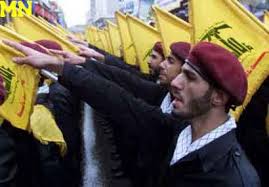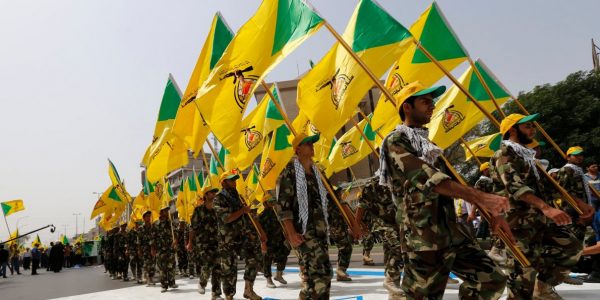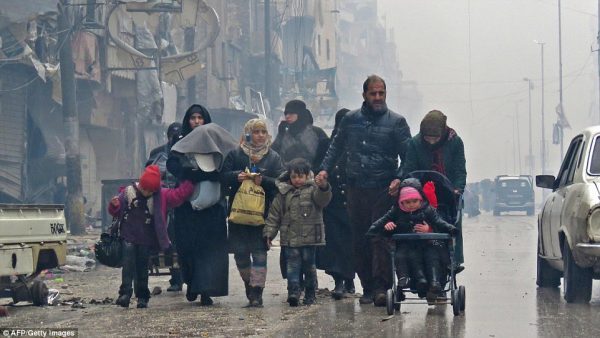
By Tom Perry, Laila Bassam, Suleiman Al-Khalidi and Tom Miles
BEIRUT, LEBANON – When rebel fighters launched a last desperate attempt to break the siege of Aleppo in October, they were beaten back – not by the Syrian army but by the Lebanese Shi’ite group Hezbollah fighting on its behalf, a senior official in the pro-government alliance said.
In the build-up to the final battle for Syria’s second city, scores of fighters from a single Iraqi Shi’ite militia were killed in just two days of combat this summer, said a commander of another group fighting for President Bashar al-Assad.
Even in the last hours of fighting in Aleppo, allied Iraqi militia were at the vanguard. The U.N. human rights office said it had reports that the Syrian army and an allied Iraqi militia had killed at least 82 civilians in captured city districts – allegations denied by the army and militia in question.
These episodes show how in the decisive battle of Syria’s nearly six-year-old civil war, Assad drew heavily on foreign Shi’ite militias sponsored by Iran for his most important victory to date.

Rebel sources say that among fighters taken prisoner by insurgents in the last months of Assad’s campaign to retake Aleppo, there was not a single Syrian soldier.
To be sure, Russian air strikes were the most important factor in Assad’s triumph. They enabled his forces to press the siege of rebel-held eastern Aleppo to devastating effect and regain full control of what was Syria’s biggest city and economic hub before the war.
But on the ground, Shi’ite militias from as far afield as Afghanistan played an important role for Assad, a member of the minority Alawite sect which is an offshoot of Shi’ite Islam.
Among these militias, which fought in and around Aleppo alongside the Tiger Force, an elite Syrian army unit lavishly backed by Russia, was the Ansar Allah al-Awfiya group.
The rebels inflicted big losses on the militia’s fighters by hitting them with a barrage of guided anti-tank missiles as they retreated in an area outside Aleppo, according to the militia commander, also an Iraqi. Reuters was unable to confirm the account with the group itself.

But Hezbollah, battle-hardened by years of conflict with Israel, played an even more important role. It ensured the siege was not broken by helping thwart a series of suicide attacks, according to the official in the pro-Assad military alliance.
“If they (the suicide attacks) had succeeded we would have been the ones under siege,” he said.
Asked about the role of Shi’ite militias in the battle for Aleppo, a Syrian military source said army statements always referred to the “allied forces” working with the army. Last year Assad publicly credited Hezbollah for its role.
SUICIDE ATTACKS
Victory in Aleppo leaves Assad virtually unassailable by the rebels but he still faces great challenges in restoring the power of his state. While he controls the most important cities in western Syria and the coast, armed groups including Islamic State control swathes of territory elsewhere in Syria.
Assad could face prolonged guerrilla warfare from forces including the Nusra Front, until recently affiliated with al Qaeda, the global jihadist network founded by Osama bin Laden.
But victory in Aleppo shows how the direction of the civil war has shifted with the support of his allies.
“The course of events in Aleppo in the last few months … has turned the tide in Syria’s war in favor of the Syrian government and resistance movement,” said Hossein Salami, the deputy head of Iran’s Revolutionary Guard, which has also deployed forces in the protracted campaign for Aleppo.
He was referring to a regional alliance grouping Hezbollah, Iran and Syria defined by hostility to Israel.
Less than 18 months ago, Assad’s forces had been losing ground across Syria and he had acknowledged there was a manpower problem in his army. Russia’s decision to intervene militarily in September 2015 helped prop up Assad, while protecting its own interests in the region.
Russian warplanes played a key role in imposing the siege, and in August launched some of their most powerful sorties yet to thwart a rebel attempt to break the siege from the south.
The rebels’ last attempt to break the siege came in late October, and was spearheaded by suicide car and truck bomb attacks on the western flank of government-held west Aleppo.
Syrian army soldiers fled when the first trucks, protected by makeshift armor, careered towards their positions. But Hezbollah sharp shooters stood their ground and opened fire, blowing up the trucks before they could hit their targets.
One Hezbollah fighter who destroyed one of the suicide truck bombs by hitting it from a distance of 200 meters (220 yards) was killed by the pressure of the blast.
“Hezbollah took a decision to halt the weapon of the car bomb regardless of how many martyrs it lost,” said the senior official in the pro-Damascus alliance.
The siege continued unbroken, and proved Assad’s most effective weapon in the campaign for Aleppo. Applied steadily over several months, it culminated with the full encirclement of eastern Aleppo this summer.
From then on, rebel fighters faced a daily struggle to find food and fuel for their families, sapping morale.
“WEIGHT” BEHIND PRO-GOVERNMENT FORCES
Hezbollah fighters have been in Syria since the early days of the civil war which grew out of protests against Assad and his government in 2011. Their role in the battle of Qusair in Homs province in 2013 was critical to stopping rebels splitting the Assad-held west in two.
Other Shi’ite militia groups arrived steadily, their level of organization growing under Iranian leadership.
The Iraqi commander described foreign fighters as the “weight” behind the pro-government forces.
“The Iranians manage all the factions, but Hezbollah is independent,” he said.
Like other sources interviewed for this story, he declined to be named as he was talking about military affairs which he was not formally allowed to discuss with the media.
Shi’ite militias generally took on the role of holding frontlines after advances led by Hezbollah or the Tiger Force, said Rolf Holmboe, a research fellow at the Canadian Global Affairs Institute and a former Danish ambassador to Syria, Lebanon and Jordan who has deep knowledge of the battlefield.
Iran sees the Syrian government’s survival as vital to its regional interests.
With their support, pro-Assad forces consolidated their positions around Aleppo and in February severed the most direct supply route from Turkey. By June, air and artillery bombardment made what had been the only way into the rebel-held areas, the Castello Road, impassable.
The Tiger Force would finally capture the road in July.
Eastern Aleppo then had a population estimated at 275,000 by the U.N. and some 7,000 rebels. Opposition groups had stockpiled months of food. Yet rebel resistance collapsed more rapidly than expected.
“COMPLETE FAILURE”
Warplanes unleashed bunker-busting bombs that left craters meters wide and brought down buildings. Hospitals were bombed out of service.
Helicopters also dropped chlorine bombs, said the Syrian Observatory for Human Rights, a Britain-based monitoring group, though the government denied this and other reported atrocities.
Some rebels said cooperation on the battlefield was weakened by a lack of trust between groups in eastern Aleppo. Others said government spies has sewn discord among the rebels.
Above all, rebel officials complain that their main allies — the United States, Turkey, Saudi Arabia and Qatar — did not offer more military assistance when Russia began air strikes.
Some rebel groups were armed with weapons including guided anti-tank missiles under a military aid program overseen by the U.S. Central Intelligence Agency. But Washington has ignored their pleas for anti-aircraft systems because of fears that they fall into the hands of more militant groups.
“It’s like you are fighting modern warfare with a sword. Bravery can only take you so far,” a Syrian opposition figure said. “It’s a complete failure of whoever is interested in seeing us win.”
REUTERS

Leave a Reply
You must be logged in to post a comment.